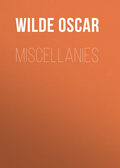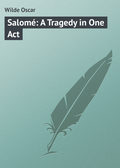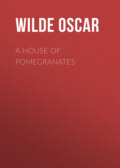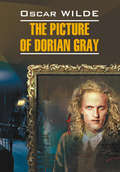полная версия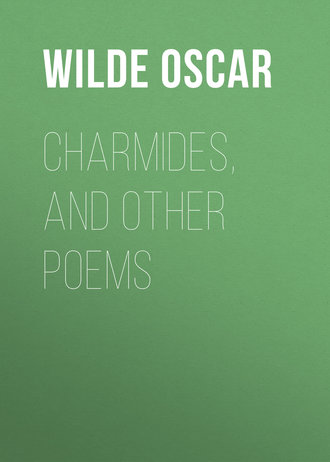

Оскар Уайльд
Charmides, and Other Poems
In profitless prostrations whose effect
Is by itself condemned, what alchemy
Can teach me this? what herb Medea brewed
Will bring the unexultant peace of essence not subdued?
The minor chord which ends the harmony,
And for its answering brother waits in vain
Sobbing for incompleted melody,
Dies a swan’s death; but I the heir of pain,
A silent Memnon with blank lidless eyes,
Wait for the light and music of those suns which never rise.
The quenched-out torch, the lonely cypress-gloom,
The little dust stored in the narrow urn,
The gentle ΧΑΙΡΕ of the Attic tomb, —
Were not these better far than to return
To my old fitful restless malady,
Or spend my days within the voiceless cave of misery?
Nay! for perchance that poppy-crownèd god
Is like the watcher by a sick man’s bed
Who talks of sleep but gives it not; his rod
Hath lost its virtue, and, when all is said,
Death is too rude, too obvious a key
To solve one single secret in a life’s philosophy.
And Love! that noble madness, whose august
And inextinguishable might can slay
The soul with honeyed drugs, – alas! I must
From such sweet ruin play the runaway,
Although too constant memory never can
Forget the archèd splendour of those brows Olympian
Which for a little season made my youth
So soft a swoon of exquisite indolence
That all the chiding of more prudent Truth
Seemed the thin voice of jealousy, – O hence
Thou huntress deadlier than Artemis!
Go seek some other quarry! for of thy too perilous bliss.
My lips have drunk enough, – no more, no more, —
Though Love himself should turn his gilded prow
Back to the troubled waters of this shore
Where I am wrecked and stranded, even now
The chariot wheels of passion sweep too near,
Hence! Hence! I pass unto a life more barren, more austere.
More barren – ay, those arms will never lean
Down through the trellised vines and draw my soul
In sweet reluctance through the tangled green;
Some other head must wear that aureole,
For I am hers who loves not any man
Whose white and stainless bosom bears the sign Gorgonian.
Let Venus go and chuck her dainty page,
And kiss his mouth, and toss his curly hair,
With net and spear and hunting equipage
Let young Adonis to his tryst repair,
But me her fond and subtle-fashioned spell
Delights no more, though I could win her dearest citadel.
Ay, though I were that laughing shepherd boy
Who from Mount Ida saw the little cloud
Pass over Tenedos and lofty Troy
And knew the coming of the Queen, and bowed
In wonder at her feet, not for the sake
Of a new Helen would I bid her hand the apple take.
Then rise supreme Athena argent-limbed!
And, if my lips be musicless, inspire
At least my life: was not thy glory hymned
By One who gave to thee his sword and lyre
Like Æschylos at well-fought Marathon,
And died to show that Milton’s England still could bear a son!
And yet I cannot tread the Portico
And live without desire, fear and pain,
Or nurture that wise calm which long ago
The grave Athenian master taught to men,
Self-poised, self-centred, and self-comforted,
To watch the world’s vain phantasies go by with unbowed head.
Alas! that serene brow, those eloquent lips,
Those eyes that mirrored all eternity,
Rest in their own Colonos, an eclipse
Hath come on Wisdom, and Mnemosyne
Is childless; in the night which she had made
For lofty secure flight Athena’s owl itself hath strayed.
Nor much with Science do I care to climb,
Although by strange and subtle witchery
She drew the moon from heaven: the Muse Time
Unrolls her gorgeous-coloured tapestry
To no less eager eyes; often indeed
In the great epic of Polymnia’s scroll I love to read
How Asia sent her myriad hosts to war
Against a little town, and panoplied
In gilded mail with jewelled scimitar,
White-shielded, purple-crested, rode the Mede
Between the waving poplars and the sea
Which men call Artemisium, till he saw Thermopylæ
Its steep ravine spanned by a narrow wall,
And on the nearer side a little brood
Of careless lions holding festival!
And stood amazèd at such hardihood,
And pitched his tent upon the reedy shore,
And stayed two days to wonder, and then crept at midnight o’er
Some unfrequented height, and coming down
The autumn forests treacherously slew
What Sparta held most dear and was the crown
Of far Eurotas, and passed on, nor knew
How God had staked an evil net for him
In the small bay at Salamis, – and yet, the page grows dim,
Its cadenced Greek delights me not, I feel
With such a goodly time too out of tune
To love it much: for like the Dial’s wheel
That from its blinded darkness strikes the noon
Yet never sees the sun, so do my eyes
Restlessly follow that which from my cheated vision flies.
O for one grand unselfish simple life
To teach us what is Wisdom! speak ye hills
Of lone Helvellyn, for this note of strife
Shunned your untroubled crags and crystal rills,
Where is that Spirit which living blamelessly
Yet dared to kiss the smitten mouth of his own century!
Speak ye Rydalian laurels! where is he
Whose gentle head ye sheltered, that pure soul
Whose gracious days of uncrowned majesty
Through lowliest conduct touched the lofty goal
Where love and duty mingle! Him at least
The most high Laws were glad of, he had sat at Wisdom’s feast;
But we are Learning’s changelings, know by rote
The clarion watchword of each Grecian school
And follow none, the flawless sword which smote
The pagan Hydra is an effete tool
Which we ourselves have blunted, what man now
Shall scale the august ancient heights and to old Reverence bow?
One such indeed I saw, but, Ichabod!
Gone is that last dear son of Italy,
Who being man died for the sake of God,
And whose unrisen bones sleep peacefully,
O guard him, guard him well, my Giotto’s tower,
Thou marble lily of the lily town! let not the lour
Of the rude tempest vex his slumber, or
The Arno with its tawny troubled gold
O’er-leap its marge, no mightier conqueror
Clomb the high Capitol in the days of old
When Rome was indeed Rome, for Liberty
Walked like a bride beside him, at which sight pale Mystery
Fled shrieking to her farthest sombrest cell
With an old man who grabbled rusty keys,
Fled shuddering, for that immemorial knell
With which oblivion buries dynasties
Swept like a wounded eagle on the blast,
As to the holy heart of Rome the great triumvir passed.
He knew the holiest heart and heights of Rome,
He drave the base wolf from the lion’s lair,
And now lies dead by that empyreal dome
Which overtops Valdarno hung in air
By Brunelleschi – O Melpomene
Breathe through thy melancholy pipe thy sweetest threnody!
Breathe through the tragic stops such melodies
That Joy’s self may grow jealous, and the Nine
Forget awhile their discreet emperies,
Mourning for him who on Rome’s lordliest shrine
Lit for men’s lives the light of Marathon,
And bare to sun-forgotten fields the fire of the sun!
O guard him, guard him well, my Giotto’s tower!
Let some young Florentine each eventide
Bring coronals of that enchanted flower
Which the dim woods of Vallombrosa hide,
And deck the marble tomb wherein he lies
Whose soul is as some mighty orb unseen of mortal eyes;
Some mighty orb whose cycled wanderings,
Being tempest-driven to the farthest rim
Where Chaos meets Creation and the wings
Of the eternal chanting Cherubim
Are pavilioned on Nothing, passed away
Into a moonless void, – and yet, though he is dust and clay,
He is not dead, the immemorial Fates
Forbid it, and the closing shears refrain.
Lift up your heads ye everlasting gates!
Ye argent clarions, sound a loftier strain
For the vile thing he hated lurks within
Its sombre house, alone with God and memories of sin.
Still what avails it that she sought her cave
That murderous mother of red harlotries?
At Munich on the marble architrave
The Grecian boys die smiling, but the seas
Which wash Ægina fret in loneliness
Not mirroring their beauty; so our lives grow colourless
For lack of our ideals, if one star
Flame torch-like in the heavens the unjust
Swift daylight kills it, and no trump of war
Can wake to passionate voice the silent dust
Which was Mazzini once! rich Niobe
For all her stony sorrows hath her sons; but Italy,
What Easter Day shall make her children rise,
Who were not Gods yet suffered? what sure feet
Shall find their grave-clothes folded? what clear eyes
Shall see them bodily? O it were meet
To roll the stone from off the sepulchre
And kiss the bleeding roses of their wounds, in love of her,
Our Italy! our mother visible!
Most blessed among nations and most sad,
For whose dear sake the young Calabrian fell
That day at Aspromonte and was glad
That in an age when God was bought and sold
One man could die for Liberty! but we, burnt out and cold,
See Honour smitten on the cheek and gyves
Bind the sweet feet of Mercy: Poverty
Creeps through our sunless lanes and with sharp knives
Cuts the warm throats of children stealthily,
And no word said: – O we are wretched men
Unworthy of our great inheritance! where is the pen
Of austere Milton? where the mighty sword
Which slew its master righteously? the years
Have lost their ancient leader, and no word
Breaks from the voiceless tripod on our ears:
While as a ruined mother in some spasm
Bears a base child and loathes it, so our best enthusiasm
Genders unlawful children, Anarchy
Freedom’s own Judas, the vile prodigal
Licence who steals the gold of Liberty
And yet has nothing, Ignorance the real
One Fraticide since Cain, Envy the asp
That stings itself to anguish, Avarice whose palsied grasp
Is in its extent stiffened, moneyed Greed
For whose dull appetite men waste away
Amid the whirr of wheels and are the seed
Of things which slay their sower, these each day
Sees rife in England, and the gentle feet
Of Beauty tread no more the stones of each unlovely street.
What even Cromwell spared is desecrated
By weed and worm, left to the stormy play
Of wind and beating snow, or renovated
By more destructful hands: Time’s worst decay
Will wreathe its ruins with some loveliness,
But these new Vandals can but make a rain-proof barrenness.
Where is that Art which bade the Angels sing
Through Lincoln’s lofty choir, till the air
Seems from such marble harmonies to ring
With sweeter song than common lips can dare
To draw from actual reed? ah! where is now
The cunning hand which made the flowering hawthorn branches bow
For Southwell’s arch, and carved the House of One
Who loved the lilies of the field with all
Our dearest English flowers? the same sun
Rises for us: the seasons natural
Weave the same tapestry of green and grey:
The unchanged hills are with us: but that Spirit hath passed away.
And yet perchance it may be better so,
For Tyranny is an incestuous Queen,
Murder her brother is her bedfellow,
And the Plague chambers with her: in obscene
And bloody paths her treacherous feet are set;
Better the empty desert and a soul inviolate!
For gentle brotherhood, the harmony
Of living in the healthful air, the swift
Clean beauty of strong limbs when men are free
And women chaste, these are the things which lift
Our souls up more than even Agnolo’s
Gaunt blinded Sibyl poring o’er the scroll of human woes,
Or Titian’s little maiden on the stair
White as her own sweet lily and as tall,
Or Mona Lisa smiling through her hair, —
Ah! somehow life is bigger after all
Than any painted angel, could we see
The God that is within us! The old Greek serenity
Which curbs the passion of that level line
Of marble youths, who with untroubled eyes
And chastened limbs ride round Athena’s shrine
And mirror her divine economies,
And balanced symmetry of what in man
Would else wage ceaseless warfare, – this at least within the span
Between our mother’s kisses and the grave
Might so inform our lives, that we could win
Such mighty empires that from her cave
Temptation would grow hoarse, and pallid Sin
Would walk ashamed of his adulteries,
And Passion creep from out the House of Lust with startled eyes.
To make the body and the spirit one
With all right things, till no thing live in vain
From morn to noon, but in sweet unison
With every pulse of flesh and throb of brain
The soul in flawless essence high enthroned,
Against all outer vain attack invincibly bastioned,
Mark with serene impartiality
The strife of things, and yet be comforted,
Knowing that by the chain causality
All separate existences are wed
Into one supreme whole, whose utterance
Is joy, or holier praise! ah! surely this were governance
Of Life in most august omnipresence,
Through which the rational intellect would find
In passion its expression, and mere sense,
Ignoble else, lend fire to the mind,
And being joined with it in harmony
More mystical than that which binds the stars planetary,
Strike from their several tones one octave chord
Whose cadence being measureless would fly
Through all the circling spheres, then to its Lord
Return refreshed with its new empery
And more exultant power, – this indeed
Could we but reach it were to find the last, the perfect creed.
Ah! it was easy when the world was young
To keep one’s life free and inviolate,
From our sad lips another song is rung,



